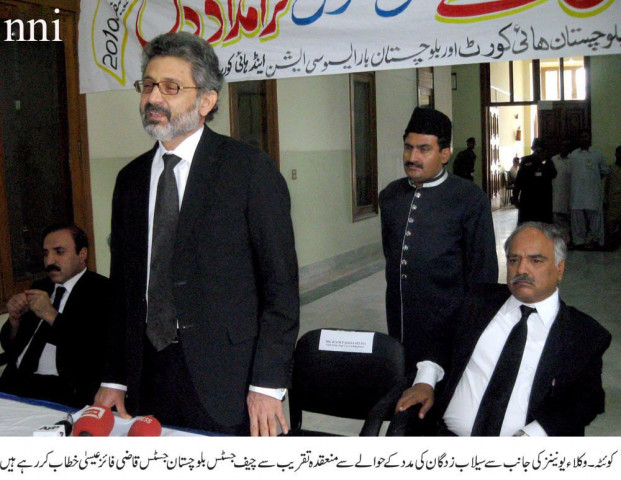Conviction ‘can’t be undone by compromise’
Justice Faez Isa writes additional note on ‘power to compound offences’

Balochistan High Court chief justice Qazi Faez Isa. PHOTO: NNI
Justice Isa, while writing an additional note in a criminal case, has said that a man, who has committed a murder, (can be) ‘acquitted’ merely because legal heirs of the murdered person compound the offence.
“[This single act] would enable the murderer, for instance, to honestly declare on a job application that he is not and has never been a convict,” the justice notes.
“The convicted person could thus be eligible to apply for [any] government employment: [he can] be employed as a teacher, inducted into the armed forces, enter the judicial service or even be appointed as a judge of the superior courts.”
Civil society in furore: Review of ‘Qisas and Diyat Ordinance 1990’ demanded
The note came after an application was submitted under Section 345 of the Code of Criminal Procedure by petitioners/convicts, stating that legal heirs of the deceased, who were murdered by the petitioners, have ‘forgiven’ them. “Therefore, the petitioners should be ordered to be released.”
The case pertains to the murder of Muhammad Ameer and Allah Yar. The petitioners were convicted by an additional sessions judge, Chiniot, under Section 302(b) of the Pakistan Penal Code.
Mureed Sultan was convicted of the murder of Muhammad Ameer while Nazeer Sultan for murdering Allah Yar. Both were sentenced to death.
The Lahore High Court maintained their convictions but altered their sentences from death to imprisonment for life. The petitioners then preferred a criminal petition for leave to appeal before the court and during the pendency of the petition a compromise was effected by the petitioners/convicts with the legal heirs of both the deceased and the application was submitted.
A report was sought from District and Sessions Judge Chiniot on August 28, 2017 to verify the legal heirs of the deceased and the genuineness of the compromise. The said judge had confirmed the genuineness of the compromise and that all the legal heirs have affirmed it.
“Both the petitioners have remained incarcerated for about eight years and four months, which period excludes the remissions in sentences that they have respectively earned. I, therefore, agree with my learned brother over the said application,” says Justice Qazi Faez Isa.
However, the judge in his additional note states that he does not agree that upon acceptance of the application it follows that they be ‘acquitted of the charge’ or that this outcome is mandated by Section 345 of the code.
Key changes in Qisas, Diyat law proposed
“Convicted murderers can only be acquitted by court of a competent jurisdiction and after application of mind by judges. Acquittal cannot be secured, or granted for that matter, whilst accepting an application under section 345 of the Code,” he adds.
“In my opinion, the effect of an acquittal is different from an acquittal. The guilt of an accused, that is ascertaining whether the accused has committed the offence for which he is charged, is determined by a trial court.
“Once the guilt of the accused has been determined, the judgment is delivered by the court. The judgment has two components; i) conviction, which means he is guilty, and ii) the sentence, which is the punishment awarded to him.”
Justice Isa said if legal heirs of the deceased compound the offence, it does not mean that the person, who was convicted for murder, was not guilty of it, which would be the case if, as a consequence of allowing the composition, he is ‘acquitted’.
“Subsection 6 of Section 345 also avoids creating such a fiction as it provides that the ‘composition of an offence … shall have the effect of an acquittal’ which means that the punishment (sentence) part of the judgment is brought to an end; neither this subsection states, nor it could, that the convict is ‘acquitted of the charge’.”
“The verdict of guilt (the conviction part of the judgment) that the trial court had recorded could only have been undone by the high court, failing which by this court; it cannot be undone by the legal heirs of the murdered persons.”
“There is then the religious aspect to the discussion. The person who has committed the sin of murder, if he professes his guilt or is convicted in this world, and serves out his sentence or is released as a consequence of the legal heirs forgiving him, may be spared the agony of punishment in the Hereafter.”



1724319076-0/Untitled-design-(5)1724319076-0-208x130.webp)















COMMENTS
Comments are moderated and generally will be posted if they are on-topic and not abusive.
For more information, please see our Comments FAQ